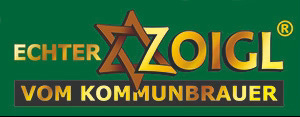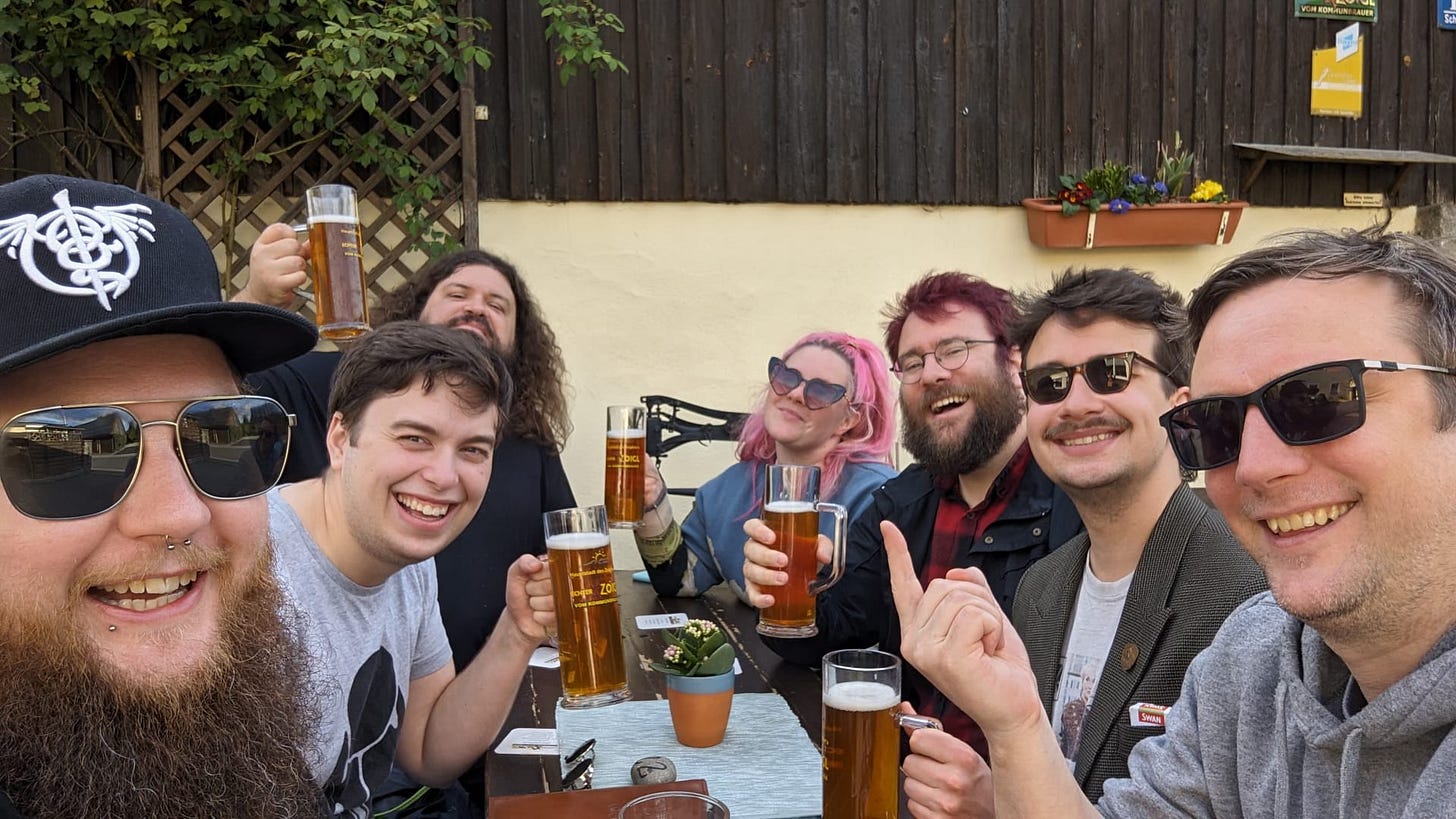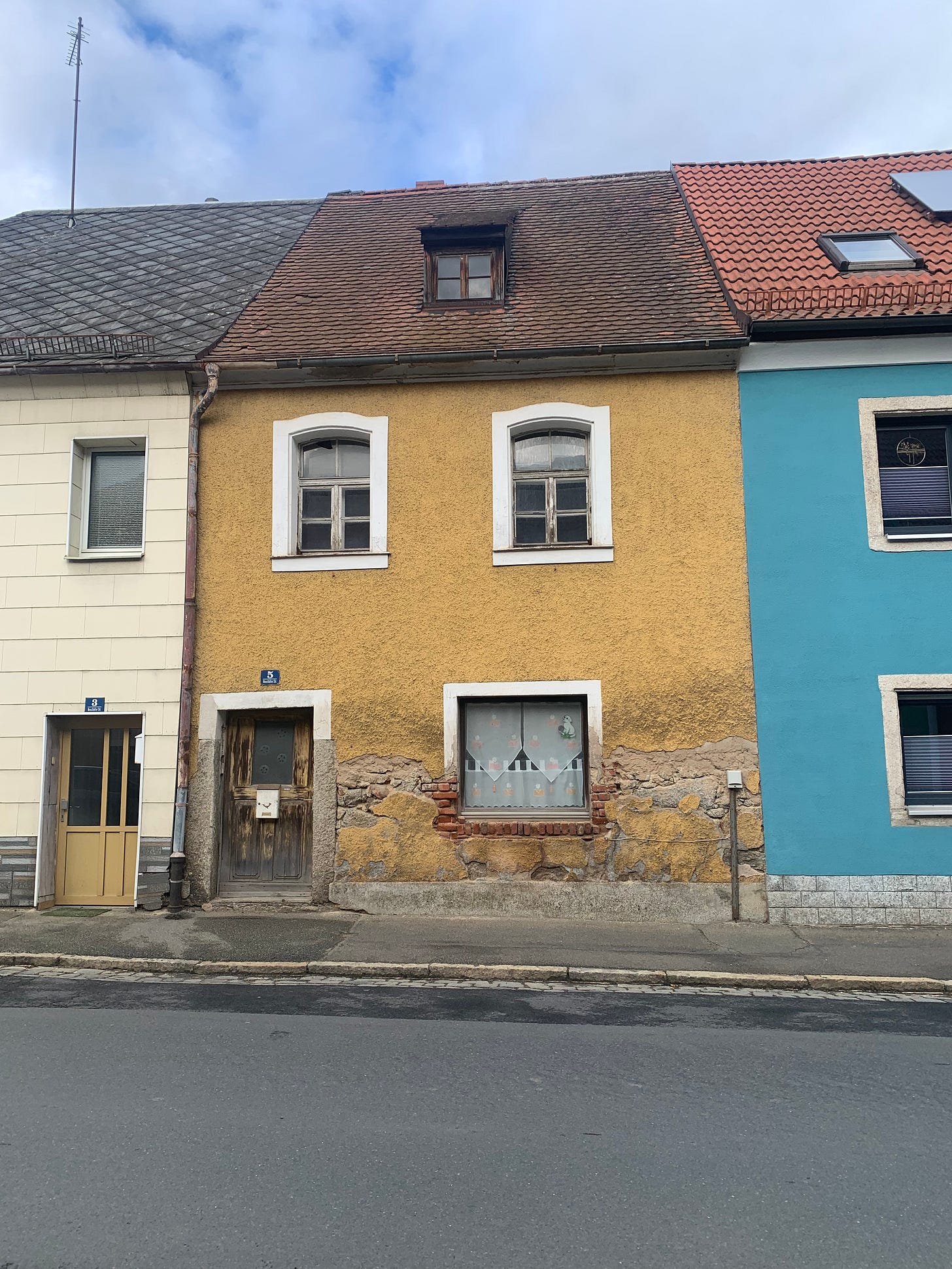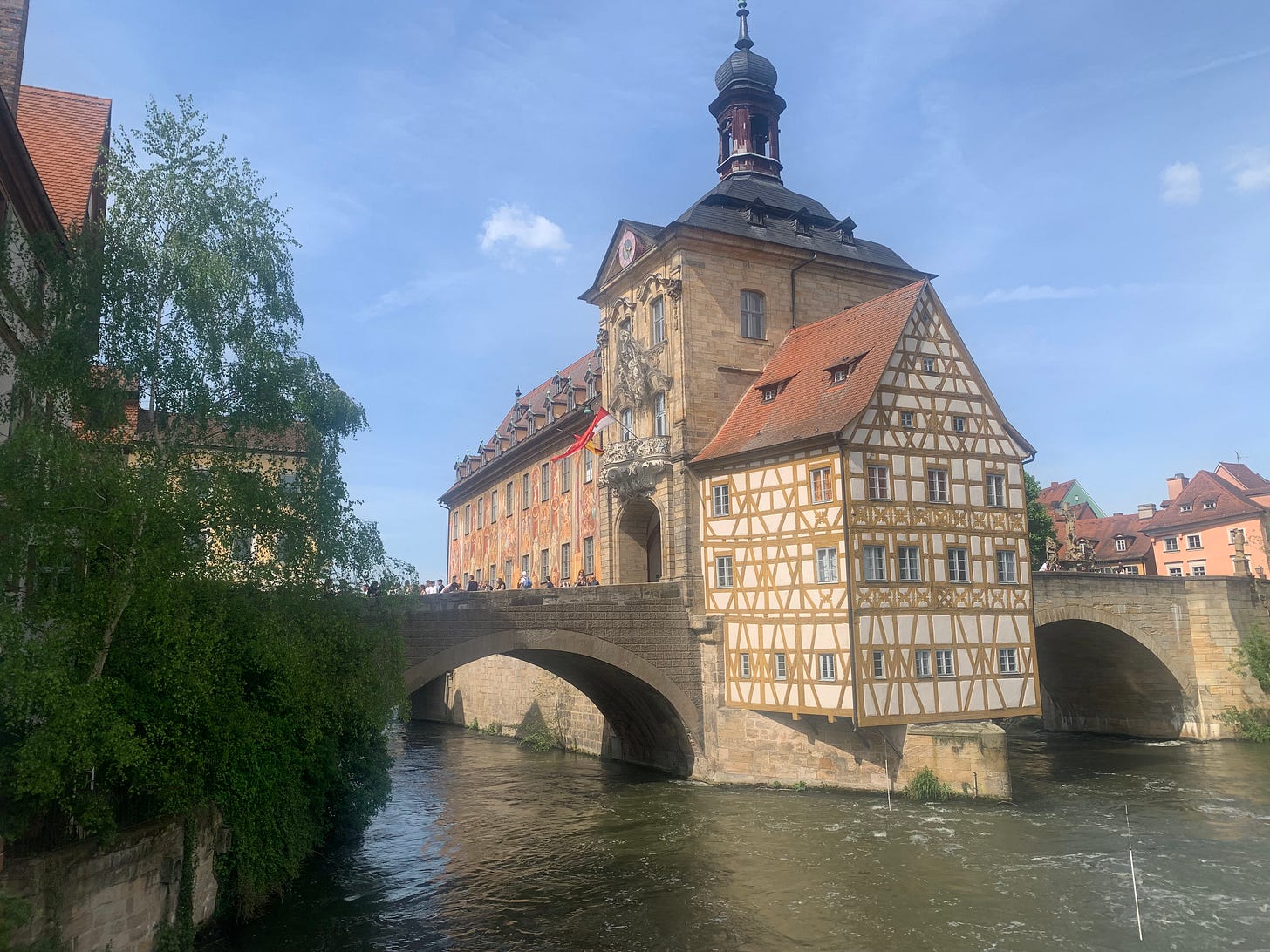Drinking Zoigl Beer in Bavaria
Where there is an ancient and unique brewing culture in the Upper Palatinate
A shorter version of this piece was originally published in Ferment Magazine.
In the Upper Palatinate of Bavaria, nestled in a hilly landscape of broadleaf forests and gently peregrinating rivers - very close to the Czech border - there are a handful of small towns that have a unique brewing culture. After brewing rights were bestowed on these towns in the 15th century they established communal brewhouses, and a tradition of serving beer from the homes of the brewers, which has remained largely unchanged ever since.
As I like to have a whinge, and always seem to be ill, I was lucky enough to go to Germany about a week after getting back from India, after my friend Gavin invited me to join his Zoigl seeking quest. I was unlucky enough, however, to have picked up Dengue fever in India which only became symptomatic once I was home, although I was mostly recovered Dengue is incredibly painful, and so getting to some of the venues in forests and up mountains was pretty exhausting. If you’re going to drink beer up a massive hill in Germany, muscle pain from Dengue fever is not recommended.
This style of brewing used to be fairly common across Europe, in England women would serve beer from their homes, but this gradually died out, with permanent inns and taverns replacing the temporary domestic openings. In these Zoigl towns, however, you can still turn up to a strangers house, sit in his living room, and for the very reasonable price of €2,40 per beer, have as many pints as you care to imbibe, often with the whole family chipping in to serve beer and small snacks. These pubs only open on certain weekends, and houses serving beer post a wooden 6-pointed star outside (symbolising the elements of earth, fire and air, and the brewing ingredients of water, hops and malt) to let you know they’re in business.
Not any old house can open up a pub, in true German style there is a committee overseeing the brewing and sales of Zoigl beer. To be recognised as true Zoigl beer, known as Echter Zoigl, beers and breweries must be made to stringent standards. The brewhouse must be wood fired, with no electricity, the beer is then cooled in a large vat known as a koelschip. The beer is then transported to the home of the Zoigl brewer before being fermented with a lager yeast at a cool cellar temperature and sold on a pre-designated weekend. The beer has been brewed like this for centuries, and a brewer or brewhouse who breaks these guidelines will be cast out of the official Echter Zoigl list and be barred from selling their beers as Zoigl. Echter Zoigl are only found in a few towns, with the villages of Neuhaus and Windischeschenbach having the highest concentration of Zoigl houses (Zoiglstuben).
The Zoiglstuben operate according to a calendar, with at least two usually having beer on any given weekend - and from a Friday morning to a Monday evening - will aim to sell out of the latest batch. Each family brews to a different recipe, and as such each Zoiglstuben has a unique beer, most are fairly standard lagers with a heavy wheat character, but some brew weisse, dunkel and rauch style beers as well, and most also offer a radler, for when you forget how to say “Prost!”
The Zoiglstuben also sell small meals and cheese, ham, eggs and pretzels are popular, but on a Sunday more advanced dishes might be served. These are typical Bavarian fare of pork shoulder with potato dumplings and saurkraut or stuffed onions or beef roulade. This is big food, heavy, salty and intensely fatty, designed to keep you drinking (or working) and it is incredibly delicious.
When I visited Windischeschenbach (Neuhaus is a technically different town, but the two are so closely linked it is hard to know where one ends and the other begins) 7 of the 12 Zoiglstuben were open. I’d like to say I tried them all, but that would be ambitious, even for a brewer.
Getting to Windischeschenbach isn’t that straightforward, from Nuremberg there is an hourly train which, after an hour and 20 minutes, will drop you at a remarkably Ghibli-esque platform in the middle of nowhere, where you must then wait for the local train to take you the final 10 minutes to Windischeschenbach. These local trains are more of a bus on wheels, only consisting of one small carriage with a bell to alert the driver when you want to get off.
Luckily, there is an All-Bavaria ticket, which allows up to 5 people to travel together, but these tickets require the names of everyone travelling to be written on the billet, or else they will be considered invalid. On the local train we made this small mistake, and were threatened with a €450 fine, until a God-sent local stepped in to explain that we were naive tourists who didn’t understand, and the guard let us get off the train. She wasn’t happy about this though, and she wailed in dispair as if we were drowning puppies whilst staring into her eyes. They say people in Germany are stoic and sensible, but this particular train witch had a penchant for the melodramatic. We ended up walking 9km back to our accommodation that day, rather than risk running into her again.
Once you arrive in Windischeschenbach, there is a calendar of which Zoiglstuben are open posted at the town hall, but should you arrive after lunch on a Saturday, there will be nowhere open to buy any food, drinks, or essentials. Prepare accordingly and don’t expect any sympathy or assistance from the locals, you’re on your own if you don’t understand how things work round these parts.
In Neuhaus we went to Zoigl Lingl, which sits in a pretty town square at the end of an obscenely steep path from Windischeschenbach, so steep that you’re left out of breath until well into your first beer. Part of this Zoiglstuben is the traditional home style establishment, but around the back there is a large and brand new room, reminiscent of a typical Bavarian restaurant, all dark wood panelling and slightly lumpy lace. Nothing in this part of the world feels completely contemporary though, making it one of the most unique and unusual beer destinations I’ve ever visited.
In town the cosiest Zoiglstuben open was Zum Roud’n, with a small outside seating area and an incredibly packed living room-cum-bar. Here the Zoigl was slightly sweeter and greener than the others we tried, very malt forward with little hop character. Zum Wießen Schwan, a hotel with a Zoiglstuben attached, keeps traditionally eccentric opening hours; closing at 2pm on a Sunday with the hotel completely out of bounds until the working week begins. Schafferhoff near the town square does serve warm food alongside it’s slightly hoppier Zoigl, with traditional beef roulade and pork shoulder featuring on a Sunday, but these will sell out by early afternoon.
For those who like to earn their beer there is a Zoiglstuben at a camping ground called Schweinmühle, a pleasant 50 minute walk from Windischeschenbach. The Zoigl here is no longer Echter Zoigl due to the upgrading of the brewhouse to electric power in recent years. The beer is delicious though, and presuming you’re not a Zoigl purist, actually much better than the Echter Zoigl beers we tried. There is also a petting zoo with some extremely grumpy pigs who like to chase the hens they’re housed with for a bit of post-prandial entertainment.
This is a very Catholic part of Bavaria, the greeting you mostly receive in the street is not a “hallo” but “servus”, indicating the willingness of the greeter to be of service to you. This religious aspect of the region also extends to the extensive pealing of bells from 6am, which is not hugely compatible with getting a lie-in after an evening of over-enthusiastic Zoigling.
The beer quality varies hugely between Zoiglstuben, which is why it’s advisable to try and visit when several are open at once, so even if you have a sub-par pint, there will be a better one a few minutes away, and you don’t waste a hangover on bad beer. Things are unusual, parochial and sometimes a little bit impenetrable, but if you’re curious to try a unique brewing culture then Zoigl is one of the most idiosyncratic. The traditions in these towns pre-dates the infamous Reinheitsgebot (or German purity law) whereby beer can only be made with malted barley, water and hops, yeast not having been discovered in 1516.
Of course there are some less out of the way, and more consistent places to get beer in the region. In the small town of Forchheim you can find some of the best beer in Bavaria, the Grief Brewery is the largest in town and make excellent traditional style lager. The real reason to visit, however, is to go to the Keller Wald, a collection of bierkellers nestled in the forest about a 30 minute walk from Forchheim station. Walking up to these beer gardens is recommended, it’s a pretty journey and the walk uphill will get you ready for a stein or two. Most of the kellers also serve traditional Bavarian food, should you fancy a Schnitzel or pork knuckle.
Some of the forest kellers are open year round, others are more seasonal or erratic, but every year there is a Franconian folk festival known as Annafest, where all of the kellers open and there is also traditional music and food available. There are 20 kellers in the complex however, and you’d be hard pressed to try a beer from each one. It’s also worth grabbing the business card of a local taxi driver (they tend to operate as sole traders rather than through a taxi firm) because once you’ve had a few litres of beer and the better part of a pig you will not much fancy the walk back through the forest to the train station.
Elsewhere in Bavaria
Bamberg is a bucket list destination for any beer fan, the fairytale like city is the home of many excellent breweries, but also the Weyermann maltster, a producer of roasted and smoked malts that most brewers hold in extremely high regard. A 30 minute train ride from Nuremberg this incredibly walkable city is the home of Schlenkerla, a brewery that makes, in my opinion, one of the best rauchbiers in the world. A brewpub has been on the site since the 1400’s and since smokeless malt drying was refined in the 1600’s Schlenkerla has been unique in producing beech smoked lagers. Drink a pint of their Märzen and get another pork and potato based feast sitting in the museum worthy beer hall then head to Brauerei Spezial to try their version. Both of these breweries smoke their own malt over beechwood fires in house, and so there are variations between the two from this process. Both make excellent beer, but I think Spezial have the edge when it comes to Märzen.
Of course there is plenty to do in Bavaria that doesn’t involve drinking. If you happen to be the area over the May bank holiday then it is well worth making a (very long) trek to Walberlafest, an ancient springtime festival that takes place on a plateau high above the Bavarian Forest. Once you ascend the 500m hill you are greeted with stalls for breweries selling their beer, grilled fish and, of course, pork. The highlight of the festival is the the raising of the maypole, done by a large team of increasingly inebriated locals using a wide variety of unlikely tools to hoist the massive stick upright. It took at least an hour, but the maypole raisers did take frequent breaks for more beer, songs and to see if they can find another table or bit of tarpaulin to help get the pole in the air. Once the maypole is up, the songs have been sung, and the local children have done some traditional dancing the mayor of the town taps a huge wooden barrel of beer and passes out massive glasses to those around. It’s worth setting off back down the hill before it gets dark, as there are no lights on the way back and plenty of ways to get lost, however there is a bar at the bottom of the hill. It’s worth getting a beer here if you fancy it as there is no chance you’ll get one in town (or anything else for that matter) and you might be left with only the meat and milk vending machines to stave off any hunger pangs you might have.
I’ve always had a slightly complicated relationship with Germany, finding it exhausting to have to play the game of being punished for not understanding how things work by being denied assistance or understanding. I realise this might just be my experience, and it’s remiss of me to tar a whole country with one brush. I did hope that this trip might change my opinion, but it rather reinforced it sadly. That’s not to say people weren’t nice or friendly, but I was completely exhausted by the time we left, which may have had something to do with the many pints of Zoigl and the last vestiges of Dengue fever. That said, the beer there is spectacular, the scenery breathtaking and the food delicious if not a bit homogenous. It’s well worth seeing an unusual brewing tradition up close, but on no account forget to bring your toothbrush.










